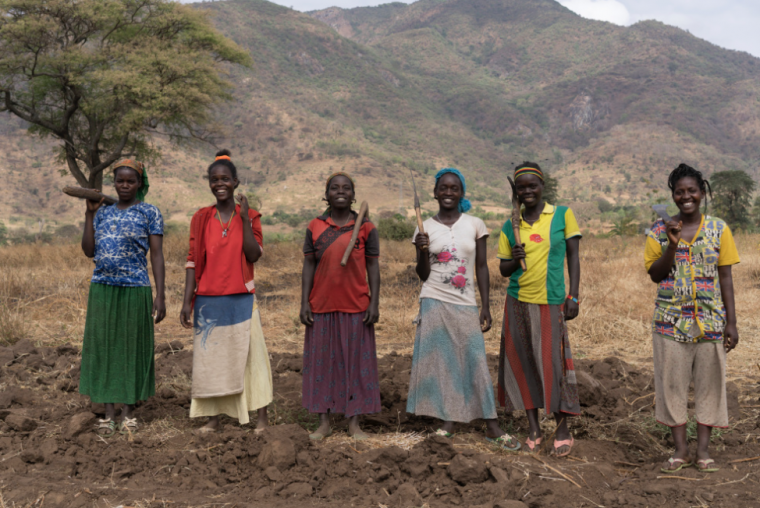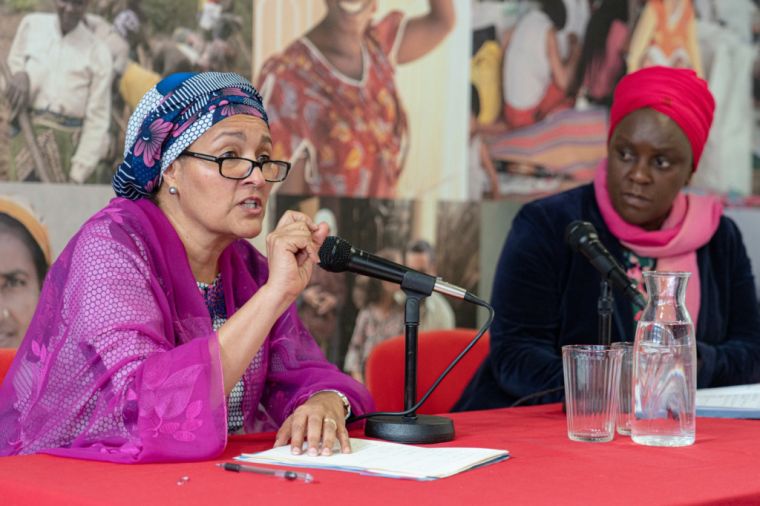UN leader appeals to faith-based organisations to 'rally around' Sustainable Development Goals

The Deputy Secretary-General of the United Nations told faith leaders and NGO workers at a Christian Aid meeting on Monday that the goals to end global poverty could not be achieved alone.
In an address at the Christian Aid's London headquarters, Amina Mohammed said that progress on achieving the wide-ranging Sustainable Development Goals by 2030 was "flatlining" and that the world was "simply not doing enough" to eradicate poverty.
"We are not going fast enough to address the challenges," she said.
"On present trends, extreme poverty is not on track for elimination by 2030, hunger is on the rise for a third consecutive year, wildlife is being lost at an alarming rate [...], disadvantaged population groups remain largely excluded, and, globally, youth are three times more likely to be unemployed than adults," while women, she added were facing "age-old hurdles".
"Facing such challenges and deep polarisation within countries across the world, no country, no group, no organisation can go it alone," she said.
"We do believe we need everyone and that includes faith-based organisations that need to rally around the SDGs with us."
Ms Mohammed, who is Nigeria's former environment minister, went on to commend faith-based organisations for showing leadership in social justice and sustainable development, and giving the UN the "ambition" it needed to adopt a "truly integrated, people-centred approach" to the 2030 agenda.

"Long before the SDGs, we know that faith-based organisations and their leaders embodied the principle of leaving no one behind and led the fight for social justice, human rights and sustainable development," she said.
"Faith-based organisations are already showing leadership in mobilising resources and networks to support the hardest to reach and shift attitudes and behaviours towards the implementation of the SDGs."
Ms Mohammed went on to warn of a "vacuum of leadership" in the world and the growing challenges of xenophobia, anti-Semitism and anti-Muslim hatred.
She called for a return to the core values of the world's major faiths, saying that the world would be "worse off" without them.
"With the rise in xenophobic rhetoric, anti-Semitism anti-Muslim hatred, there is a growing global interest in engaging religious actors as peace mediators," she continued.
"I think in theory, we need to get back to those core values that every faith has. We need to find back our humanity so that we can push back against some of these headwinds."
She praised faith groups for going the distance to bring peace in their communities, saying that they were often still there after others had left.
"Time and time again, we know that faith-based organisations have stood in the face of rising tension and conflict and continue to do so in the Democratic Republic of Congo, Nigeria and South Sudan, and it's really tough," she said.
"As we walk through some of our pathways to peace, on the other side is sustaining peace and that is where really we see faith-based organisations always there the day after where many have dropped the ball, have left and have not gone the full mileage that they needed to do to make sure that we have preserved peace."
Christian Aid Chief Executive Amanda Mukwashi said there was a need for faith-based NGOs to "reinvent" themselves in order to be effective in meeting the current developmental challenges, and that with the divide between the Global North and Global South disappearing, it was time for NGOs to "learn and re-learn - or be left behind".
She also admitted that Christian Aid was grappling with how it could best address global injustices while also recognising the existence of poverty on its doorstep in Britain.
"How do we reinvent ourselves to be able to meet the challenges of our time? Because the challenge is different from the time we were set up and while we may be evolving as an organisation, is this perhaps a time for us to do more than tweaking?" she said.
"Is this a time for us actually to really transform ourselves so that we can grapple with the issues that quite frankly we haven't seen in our generation - whether it is the polarisation of politics or views, the divisions at domestic levels and global levels, the challenge to multilateral agreements [or] the issue of climate challenge."
She continued: "The things that keep us awake at night as organisations are those issues where you go out here in Waterloo [London, where Christian Aid is based] and you find people are sleeping on the street. Can you ignore them and say no, I am only concerned about the people who sleep on the streets in Malawi?
"They are both human beings. The issues, the experience is of injustice [and it] impacts people equally across the world."
She added: "We are beginning to grapple with this conversation."











